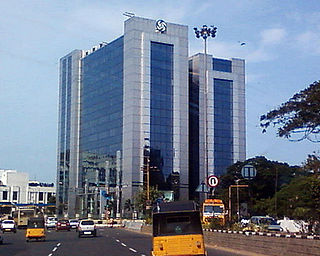
Ashok Leyland is an Indian multinational automotive manufacturer, with their headquarters in Chennai. It is owned by the Hinduja Group. It was founded in 1948 as Ashok Motors which became Ashok Leyland in the year 1955 after collaboration with British Leyland. Ashok Leyland is the second largest manufacturer of commercial vehicles in India, the third largest manufacturer of buses in the world, and the tenth largest manufacturer of trucks.

A midibus is a classification of single-decker minibuses which are generally larger than a traditional minibus but smaller than a full-size single decker and can be anywhere between 8 metres and 11 metres long. While used in many parts of the world, the midibus is perhaps most common in the United Kingdom, where operators have found them more economical, and to have a sufficient number of seats compared to full size single-decker buses.
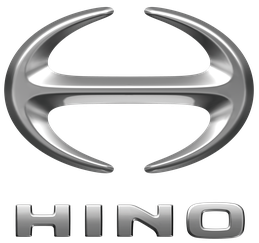
Hino Motors, Ltd., commonly known as Hino, is a Japanese manufacturer of commercial vehicles and diesel engines headquartered in Hino, Tokyo. The company was established in 1942 as a corporate spin-off from previous manufacturers.

The Toyota Dyna is a light to medium-duty cab over truck for commercial use. In the Japanese market, the Dyna is sold alongside its twin called the Toyoace. The Toyoace was a renaming of the Toyopet SKB Truck as a result of a 1956 public competition with 200,000 entries. "Dyna" is short for dynamic.

The Mitsubishi Fuso Aero Bus (kana:三菱ふそう・エアロバス) is a series of heavy-duty intercity coaches produced by the Japanese manufacturer Mitsubishi Fuso. The range was primarily unavailable with left-hand drive. However, Turkish bus maker Temsa used produce a left hand drive variant models, called Mitsubishi Maraton and Prenses (facelift) and later Safir, while Hyundai Motor Company produced another left hand drive variant called the Hyundai Aero. Its principal Japanese competitors are Isuzu Gala, Nissan Diesel Space Arrow and Hino S'elega.

The Mitsubishi Fuso Aero Star (kana:三菱ふそう・エアロスター) is a heavy-duty single-decker bus produced by the Japanese manufacturer Mitsubishi Fuso. The range was available as either a public bus or a coach. Its principal competitors are the Isuzu Erga, the Nissan Diesel Space Runner RA and the Hino Blue Ribbon.

The Toyota FCHV is a hybrid hydrogen fuel cell vehicle development programme of the Toyota Motor Corporation, which was leased to a limited number of drivers in the United States and Japan beginning in 2002. The Toyota FCHV and Honda FCX, which began leasing on 2 December 2002, became the world's first government-certified commercial hydrogen fuel cell vehicles. Its first commercial fuel cell vehicle was developed from the FCHV-4, which was adapted from the Toyota Highlander body. "FCHV" stands for "Fuel Cell Hybrid Vehicle". A number of prototypes have been produced, up to the latest FCHV-adv ("advanced").

The Isuzu Erga (kana:いすゞ・エルガ) is a heavy-duty single-decker bus produced by Isuzu through the J-Bus joint venture. It is primarily available as a public bus in either a complete bus or a bus chassis. It is built by J-Bus from Japan either as a step-entrance bus or a low-floor bus.

The Isuzu Erga Mio (kana:いすゞ・エルガミオ) is a medium-duty single-decker bus produced by Isuzu through the J-Bus joint venture. It is the second medium duty bus under the Mio name, after the Gala Mio intercity coach. It is built by J-Bus from Japan either as an integral bus or a bus chassis.

The Mitsubishi Fuso Aero King (kana:三菱ふそう・エアロキング) was a series of heavy-duty double-decker coaches built by Mitsubishi Fuso Truck and Bus Corporation.
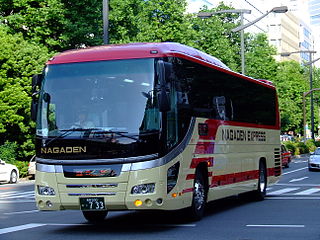
The Hino S'elega (kana:日野・セレガ) is a heavy-duty passenger coach produced by Hino Motors through the J-Bus joint-venture. They have primarily served as a tourist coach since 1990.
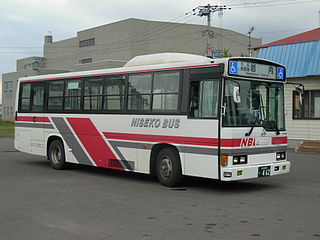
The Hino Rainbow (kana:日野・レインボー) is a medium-duty single-decker bus marketed by the Japanese manufacturer Hino since 1980. The range can be built as either a complete bus or a bus chassis. It was also available for the city bus for the midibus and the tourist coach for the minibus. Asia Motors released as a badge engineered version called the Cosmos. It is built by J-Bus.

The Nissan Diesel UA (kana:日産ディーゼル・UA) was a full-size single-decker bus produced by the Japanese manufacturer Nissan Diesel for 32 years of production from 1973 until 2005. It can be built as either a bus chassis or an integral bus. Competitors of the UA include the Isuzu Cubic, Mitsubishi Fuso Aero Star and the Hino Blue Ribbon.
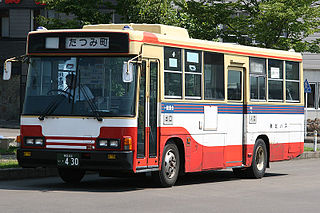
The Isuzu Erga Journey-K (kana:いすゞ・ジャーニーK) was a midibus built by Isuzu of Japan from 1984 to 1999. The range was primarily available as a public bus and an intercity bus either as an integral bus or a bus chassis.

A single-decker bus or single-decker is a bus that has a single deck for passengers. Normally the use of the term single-decker refers to a standard two-axled rigid bus, in direct contrast to the use of the term double-decker bus, which is essentially a bus with two passenger decks and a staircase. These types of single-deckers may feature one or more doors, and varying internal combustion engine positions. The majority of single-deckers have a length of up to 12 metres, although some exceptions of longer buses exist. They also typically weigh between 11 and 14 tons.
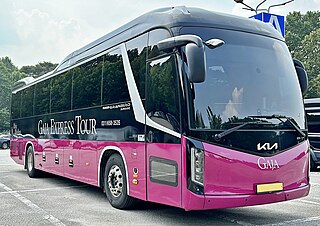
The Kia Granbird is a high-decker coach produced by the South Korean manufacturer Kia. It was derived from the Hino S'elega platform and for a brief period of time from former Asia Motors. Production started in 1994, and the exterior look stayed the same until the second generation in 2007, and then finally a refresh in 2020. The Granbird is manufactured at Kia's Gwangju plant, which also makes the Soul, Sportage, Rondo, and Kia's commercial and military trucks. The Granbird is only sold in selected markets.

A hybrid electric truck is a form of truck that uses hybrid electric vehicle (HEV) technology for propulsion, instead of using only a combustion engine.
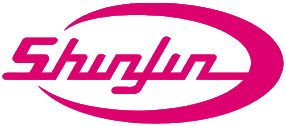
Shinjin Motors or Sinjin Motors is a defunct South Korean car manufacturer.
Shinjin H-SJ Micro Bus was introduced in 1962 as part of growing company at Shinjin Industrial Company.

The GAZ-3310 Valdai is a medium-class flat bed truck formerly produced from late 2004 until 2015 at the Gorky Automobile Plant in Russia. It differs from the "GAZelle" light commercial vehicle in that it does require a category C driver's license. The production of the truck ended in December 2015.


















































